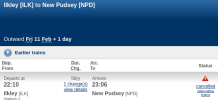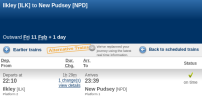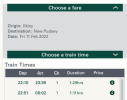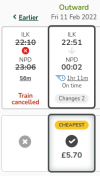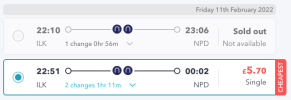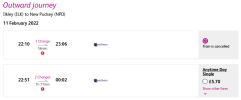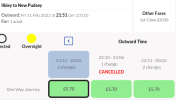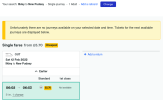I made a formal complaint to National Rail that they were not providing the "Published Timetable of the Day" (PTD) that is specified in 30.1 in the new NRCoT applying from 6th February. They have now responded:
I would like to clarify that the snapshot of the timetable remains static on all journey planner results made after 22:00 the night before travel. If the Published Timetable of the Day (PTD) changes, it is updated as an amendment or a cancellation in the journey planner. The PTD will be available in the journey planner from 22:00 the night before, all the way up until the end of service for that day.
I would like to explain this further through the following scenario:
• A customer visits our journey planner or visits a ticket office on Monday to purchase a ticket to travel from station A to station C (assuming that this journey takes an hour to complete), which departs at 15:00 and arrives at 16:00 on Thursday.
• In this scenario, if the train operator of the 15:00 service cannot run the service and has to run it at 15:30 instead, they must confirm this change in the timetable and make it available by 22:00 on Wednesday. Once this change is reflected on our journey planner at 22:00 on Wednesday, this will make it the scheduled service. This means that the 15:00 service has now become the 15:30 service in the PTD for Thursday.
• If the (current) 15:30 service does not experience any delays on route and arrives at 16:30, then this will not be regarded as a 30 minute delay, and therefore, the customer will not be able to claim compensation.
• However, if the (current) 15:30 service does experience delays on route and arrives at 17:00, then this will be regarded as a 30 minute delay instead of a 60 minute delay. In this case, the customer can claim for compensation for the 30 minute delay on the route.
• If the train operator of the 15:00 service decides to run the same service at 15:30 and fails to make it available on the timetable by 22:00 on Wednesday, then the 15:00 service will remain as the scheduled service on the PTD for Thursday and will show a 30 minute delay to its start time.
• I would also like to advise you that the condition 30.1 in the NRCoT allows the customer to obtain a full refund on their ticket if they no longer wish to travel from A to C on the 15:30 service. However, it is permissible to travel on the 15:30 service if they decide to do so.
Furthermore, I agree that customers will use the PTD as a reference point to check if they are eligible for Delay Repay, and therefore, I can confirm that they can do so by searching for their journey in the journey planner.
Does this make sense?
Is the National Rail Journey Planner really frozen from 2200 the night before service, so that later changes aren't possible after that?
Am I right in understanding them to admit that the PTD will disappear at the end of the day of travel? That would appear to oblige passengers wanting to be sure they are give the right amount of Delay Repay to access and screenshot the NR Journey Planner version of their itinerary before the end of the day, which could be particularly difficult if you have suffered a delay to a late-evening service.

